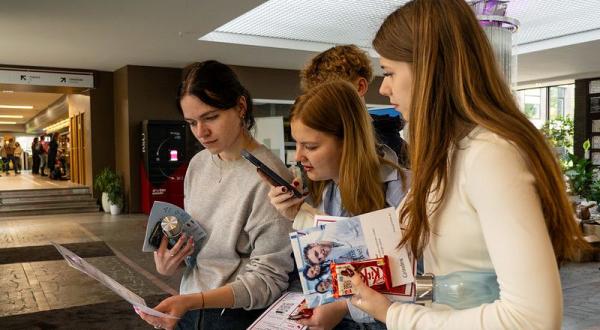Prospective Doctor Marija Luīze Kalniņa on Being a Doctor and Working in a COVID-19 Ward
‘My duty is to help patients today,’ says Marija Luīze Kalniņa, a 6th-year student at the Rīga Stradiņš University (RSU) Faculty of Medicine. The young woman is one of many prospective doctors currently working in the nation’s hospitals helping to treat patients, including COVID-19 patients. The student has been working at the hospital already from the beginning of last summer. We asked Marija Luīze about her impressions of the clinic then compared to what it is like today.
Why did you decide to start working at the hospital last summer?
The national state of emergency began in March, and since studies became remote, I quickly realised that I couldn't just sit at home. The hospital was the place where I felt I could be most helpful. I therefore started looking for places where I could get involved, and I found the right place at Pauls Stradiņš Clinical University Hospital at the end of May.
What were your responsibilities when you started working and what are they now during the second wave of COVID-19?
I started working as a medical assistant and that’s what I’m still doing.
My colleagues from different departments and I are always ready to put on personal protective equipment to receive and care for COVID-19 patients.
Special wards have been created for COVID-19 patients, and you can be called to work in one at any moment. Over the holidays, we made lists of which staff were available to spend the holidays in the ward in case there was a large influx of patients and there was a need for extra support.
Have you been afraid of working in the COVID-19 ward?
I felt worried before my first shift. I think that I wasn’t afraid of the disease itself, because we had personal protective equipment available to us and the overall safety high. Rather, I was afraid of the unknown, of how seriously ill the patients might be and what new responsibilities I would have to take on. I was nervous that I might encounter things I didn’t know.
I think many healthcare workers working in COVID-19 wards are anxious because they don’t know what their routine is going to be.
So far, however, I have been able to cope with my responsibilities successfully, and I can feel that I’m learning new things.
What would you say to other students who are still considering whether to get involved in hospital work?
I am well aware that it is difficult to decide whether you are ready or feel safe enough to start working in a hospital or other healthcare institutions.
Personally, I felt that this was my duty and my calling at this time when things are very difficult. I see taking care of patients and doing everything I possibly can to help the healthcare system as my future mission.
Everyday life in the COVID-19 ward and in the hospital as a whole is very difficult at the moment. It is both emotionally and physically difficult to take care of patients, so students should consider whether they are ready to get involved in any of these wards very carefully.
Why did you choose to become a doctor?
I don't think that I chose the medical profession, but rather that the medical profession chose me. I have always enjoyed science as well as talking and communicating with people. At one point in secondary school, I realised that the medical profession was the middle ground I was looking for, and since then I have not doubted my decision.




